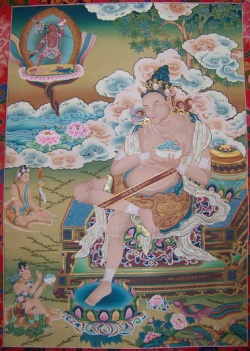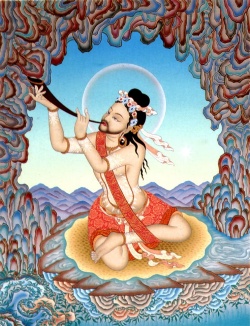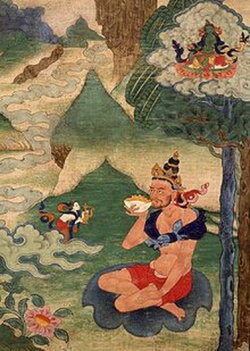Tummo
Click here to see other articles relating to word Tummo
Tummo (Tib. གཏུམ་མོ་, Wyl. gtum mo), or chandali (Skt. caṇḍāli) is the practice of inner heat’, one of the Six Yogas of Naropa, and the ‘root of the path’, according to Dilgo Khyentse Rinpoche.
Further Reading
- Lama Thubten Yeshe, The Bliss of Inner Fire, Wisdom Publications, 1998.
Source
Tummo (Tibetan: gtum-mo; Sanskrit: caṇḍālī) is a Form of Yoga, found in the Six Yogas of Naropa, Lamdre, Kalachakra and Anuyoga teachings of Tibetan Vajrayana.
Tummo originally derives from Indian Vajrayana tradition, including the instruction of the Mahasiddha Krishnacarya and the Hevajra Tantra.
The purpose of tummo is to gain control over Body processes during the Completion stage of 'highest yoga Tantra' (Anuttarayoga Tantra) or Anuyoga.
Nomenclature, orthography and etymology
Tummo (gTum mo in Wylie transliteration, also spelled Tumo, or Tum-mo; Sanskrit caṇḍālī) is a Tibetan word, literally meaning fierce woman.
Tummo is a Tibetan word for inner Fire.
Orthography
Tummo may also be rendered in English approximating its phonemic enunciation as 'Dumo'.
Practice
The channels do not exist in the way they are visualized during Vajrayana practice.
For example, during a deity visualization, the physical human Body is visualized as completely hollow, made of Light and has no internal organs.
Furthermore, different systems have different visualizations.
In actuality, the "center channel" (dbu ma or avadhuti) is the whole arterial system, or more specifically the aorta.
The two "side channels" are the venous system (roma or rasanā) and the spinal column and nervous system (rkyang ma or lalanā).
A chakra is any place in the Body where there are clusters of arteries, veins and nerves.
After familiarity in trul khor, there is the practice of tummo.
In the practice of tummo, the visualization of lower ends to the three channels is primarily used to focus Body awareness in the subnavel area.
Breath retention, mulabandha and Uddiyana bandha force vāyu (wind, air) and ojas into the arterial system.
The Heart rate slows, the karmic winds suspend and the venous blood returns less impurities into the blood stream.
This leads to longevity.
Ojas itself has two stores within the Body -- the Heart and brain.
Thus there is the visualization of blazing and dripping.
When the vāyu moves very little, that is considered subtle Mind.
This is because the Mind is inexorably linked to the winds, or even considered synonymous with the winds.
Sutrayana has no comparable methods to reduce the movement of vāyu to a significant extent.
Kundalini and tummo
Miranda Shaw clarifies:
- Kuṇḍalinī-yoga offered a range of techniques to harness the powerful psycho-physical energy coursing through the Body...
Most people simply allow the energy to churn in a cauldron of chaotic thoughts and emotions or dissipate the energy in a superficial pursuit of pleasure, but a yogi or yogini consciously accumulates and then directs it for specified purposes.
This energy generates warmth as it accumulates and becomes an inner Fire or inner heat (candālī) that [potentially] burns away the dross of Ignorance and ego-clinging.
Numerous non-buddhist Tantras of the Shakta and Shaiva traditions (generally termed Hindu by westerners) speak of Kundalini, which is generally described as a coiled energy at the base of the spine, at the first chakra.
Overview
Kurt Keutzer (2002) discusses the Kundalini yoga, Vajrayana, Nath Sampradaya, Mahasiddha and Milarepa:
- Kundalini yoga in the Natha Sampradaya and Vajrayana in Tibetan Buddhism both take their origin from the Mahasiddhas who were active in India from the 8th century to the 12th century.
Kundalini yoga practices formed the core of the teachings of a number of these Mahasiddhas and are strongly represented in both Tibetan Buddhist practices and contemporary kundalini yoga practices.
Kundalini yoga was spoken of as "Candali yoga" by these Mahasiddhas and became known as gTummo rnal 'byor in Tibet.
Candali yoga was a key practice of the famous Tibetan yogin Milarepa.
Modern western witnesses of this practice include the adventurer Alexandra David-Néel (David-Néel, 1971), Lama Anagarika Govinda (Govinda, 1988), and anthropologist Dr. John Crook. Dr Arya (2006) in discussing the winds (Tibetan:
rLung) states that historically: "The rLung practitioner (yogi) uses special colors of Clothes to improve the Power of the Tummo Fire."
Dr Arya (2006) also states:
- The psychic heat Drod is produced by the space particles and the heat manifested from the friction of the wind element.
This is another fundamental element as it supports and gives Power to the Consciousness, like the Power of the Fire that can launch rockets to space.
The Power is called medrod or 'digestion Fire' in medicine and Tummo in yoga Tantra.
The heat (Fire) sustains Life and protects the Body/Mind.
The psychic Fire increases the Wisdom, burns the ignorant Mind of the brain and gives realization and Liberation from the darkness of unawareness.
That is why yoga describes Tummo as the aggressive Fire which ignites from below navel, pierces the chakras one by one and reaches the sky of the crown chakra.
The tummo burning arrow married with the celestial bride leads to enjoy the Life of transformation of Samsara.
They give birth to the son of awareness from the blissful garden of Vajrayogini.
Scientific Investigation
An attempt to study the physiological effects of Tummo has been made by Benson and colleagues (Benson et al., 1982; Cromie, 2002) who studied Indo-Tibetan Yogis in the Himalayas and in India in the 1980s.
In the first experiment, in Upper Dharamsala (India), Benson et al. (1982) found that these subjects exhibited the capacity to increase the temperature of their fingers and toes by as much as 8.3°C.
In a 2002 experiment, conducted in Normandy (France), two Monks from the Buddhist tradition wore sensors that recorded changes in heat production and metabolism (Cromie, 2002) .
Source
HISTORY OF TUMMO
Tummo is a spiritual technique taught by Tibetan Lamas.
Tummo in Tibet is not translated as heat, but rather depicts Mystical technique, and the energy generated was not primarily to warm the Body of the practitioner, but to support the spiritual progress of the practitioner.
Tibetans divide Tummo into three categories:
Tummo exoteric which grants the Body the ability to heal and subtle warmth.
Esoteric Tummo which allows the Body to survive even in extreme cold, and
the Mystic Tummo (Kriya Yoga) which gives warmth in spiritual achievements while living in this World.
Tummo esoteric (Chandali) is very well known and is mastered by many Tibetans who either gain it through one's own effort, or through initiation or Angkur from a Vajra Master.
While Tummo exoteric and mystic is not mastered by many people, even among Tibetan mystic, there are only several people who mastered the three kinds of Tummo.
Benefit Of Tummo
With the flow of Tummo in oneself, all Body level, physical, Mental, emotional and intuition level will progress much faster.
With Tummo esoteric of course one can survive in extreme cold even without any single cloth like what happened at Lachi Kang (near Everest summit), Himalaya.
The Mastery of Tummo exoteric is very beneficial for the curement of various kind of ailments and illness on all levels, physical, Mental, emotional and spiritual.
It is very easy to use Tummo because it does not require Concentration at all and the Healing will happen automatically simultaneously at all levels of beingness.
A Tummo practitioner himself doesn't need to know and able to diagnose the patient's illness, this way it helps patients who feel embarrassed to speak of his/her illness.
Tummo mystic will surely cause Tummo practitioner to achieve Meditation perfection in very short time.
Sakya Tummo
Sakya Tummo is a Tummo system that originated from Buddhism.
Therefore, this Sakya Tummo is of direct lineage: Sastra Vardhana - Your Name..
Different with other Tummo system in general, Sakya Tummo only gives angkur once, which is of Vajra Master grade.
Despite of that, the Sakya Tummo angkur is already comprised of all grades whole fully, mantras and mudras, and also Vajra Body protector, Vajra weapon and many others.
It is a Tummo system that is very integrated and is very powerful.
Sakya Tummo allows a Disciple to accelerate his/her spiritual advancement and inner Power in Healing others.
Energi Composition of Sakya Tummo
Sakya Tummo
Inside human Body, there exist at least three kinds of energy.
Those three kind of energies are utilized optimally as Booster in Tummo technique.
Those three kind of energies are:
- Vayu, Living energi of the Universe that flows inside the Body.
Vayu is a wind element.
There are many kinds of Vayu, but the most important among them are five, which are:
- Ojas, Energy generated from drinking. This energy is of water element. Ojas is obtained from water that we drink, juicy fruits and fresh vegetables.
Sakya Tummo Angkur will also give harmonious adjustments with the Universe energy that will enter from your Crown Chakra, and arouse the Awakening of Kundalini energy(only to extent of Kundalini energy.
Not the Consciousness nor such higher level
Kundalini is contained in 7 layers of concentric ball.
The rotation of this seventh layer will be accelerated) which will arouse from your Base Chakra, which will then be combined with Vayu, Ojas, and Tejas.
That is why Tummo is felt by some of its practitioners have stronger energy Power than Reiki.
Someone which serious to true elaborate area of spiritual shall also take system of Tummo, because in system of Tummo hence we will obtain
- Activation Source of Energy in Body like Bottom, Middle And Upper Tantien.
- Activation and evocation fully Kundalini
- Activation of Shield or Aura Protector of Body from all metaphysics attack
- Activation and stabilize system of Yin Yang Body
- Activation all 72.000 band of nadis and 365 chakra in physical and etheric Body
- Activation of Universe energi and earth
- Activation of Third Eye, Pineal and Pluitary Gland, and Ajna System
- Activation all energy system of Body include Vayu, Ojas, Tejas and Tattva.



